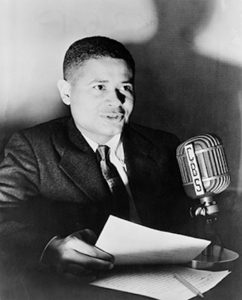
William Worthy Jr.
*William Worthy, Jr. was born on this date in 1921. He was a Black journalist, civil rights activist, and dissident.
Born in Boston, Massachusetts, his father was an Obstetrician. Worthy Jr. graduated from Boston Latin High School and received a B.A. in sociology from Bates College, Lewiston, Maine, in 1942. Worthy was a Nieman Fellow at Harvard University, class of 1957. Worthy was a civil rights activist during the 1940s, 1950s, and 1960s. In the early 1960s, he was an outspoken critic of the American civil rights movement for not going far enough to achieve civil rights in housing and all areas of American life.
Worthy was an important political ally of Malcolm X. In the late 1960s, Worthy organized a rent strike against a Catholic hospital in New York City that attempted to tear down Worthy's apartment building and turn it into a parking lot. Worthy later wrote about those experiences in a critically acclaimed book, The Rape of Our Neighborhoods, published in 1976. The late psychologist Kenneth B. Clark, said of him: "The Bill Worthy’s of our society provide the moral fuel necessary to prevent the flickering conscience of our society from going out."
Worthy traveled to China (1956–57) and Cuba (1961), violating United States State Department travel regulations. When he entered China, he was the first American reporter to visit and broadcast from there since the country's communist revolution in 1949. While in China, Worthy interviewed Samuel David Hawkins. He was an American soldier captured by the Chinese during the Korean War and defected to China in 1953. His passport was seized upon his return to the U.S. from China, and American lawyers Leonard Boudin and William Kunstler represented Worthy in an unsuccessful lawsuit seeking the return of his passport. Without a passport, Worthy traveled to Cuba in the early days of Fidel Castro to report on the Cuban revolution, and upon his return to the U.S., he was tried and convicted for "returning to the United States without a valid passport."
Kunstler again represented Worthy, who successfully persuaded a federal appeals court to overturn Worthy's conviction. The U.S. Court of Appeals for the Fifth Circuit found the restrictions unconstitutional. The court held that the government could not make it a crime under the Constitution to return home without a passport. The Committee for the Freedom of William Worthy was formed in 1962 and was chaired by A. Phillip Randolph and Bishop D. Ward Nichols. Folksinger Phil Ochs wrote a song called "The Ballad of William Worthy" about Worthy's trip to Cuba and its consequences.
He was a conscientious objector in World War II, and in 1954, he voiced early opposition to American involvement in Vietnam after he visited Indo-China in 1953. Worthy was a reporter for the Baltimore Afro-American on and off from 1953 to 1980. He wrote a column and covered revolutions in Iran, Cuba, and China. Although a supporter of Malcolm X, he was critical of the Black Panthers in a 1969 column for "gratuitous and indiscriminate" 'Uncle Tom' attacks on virtually all the black bourgeois" and their exposure to law enforcement due to "sloppy, inefficient, undisciplined organizational follow-through."
He continued to work as a journalist, and in the 1970s, he was appointed head of the African American journalism program at Boston University. However, the school president, John Silber, removed Worthy as head of the program after Worthy criticized the university's administration, and he supported campus workers who were attempting to unionize. In 1981, the luggage of Worthy and two other journalists working with him, Terri Taylor and Randy Goodman, was seized by the FBI and CIA on their return from Iran, and they subsequently won a suit on Fourth Amendment grounds. Following his BU appointment, Worthy taught journalism at UMass Boston. William Worthy and Michael Lindsey co-taught the country's first class in Critical Journalism at the College of Public and Community Service, a branch of UMass Boston. Noam Chomsky was a guest lecturer.
He also taught at Howard University in the 1980s and 1990s and held the Annenberg Chair. From most of the 1990s until 2005, Worthy lived in Washington, D.C., where he served as a special assistant to the dean of the School of Communications at Howard U. and served on the board of directors of the National Whistleblower Center. On February 22, 2008, the Nieman Foundation honored Worthy with the prestigious Louis M. Lyons Award. William Worthy Jr. died in Brewster, Massachusetts, on May 4, 2014, at 92, of Alzheimer's disease.